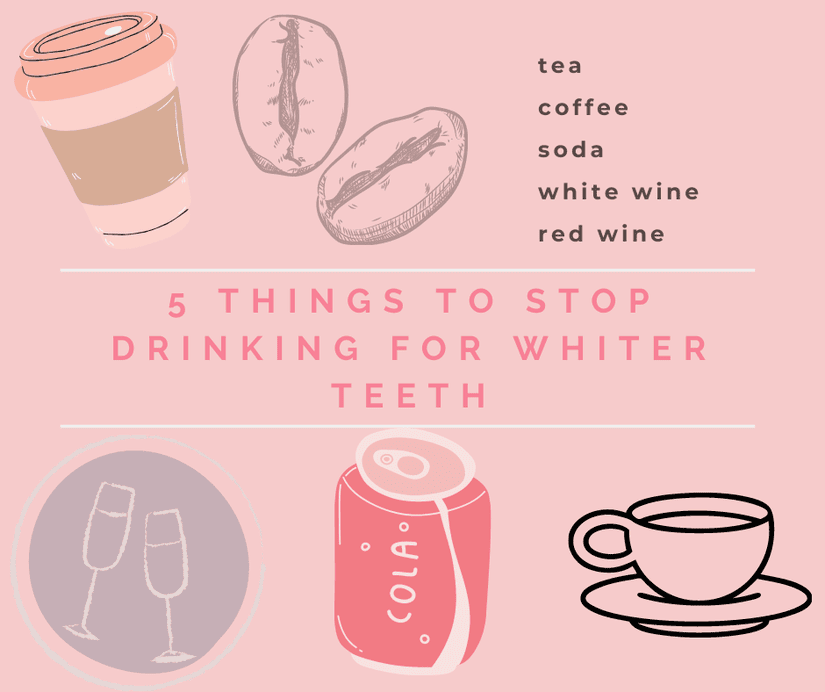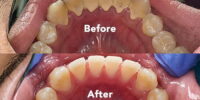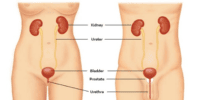5 Things To Stop Drinking For Whiter Teeth

Are you looking for an easy way to whiten your teeth? You may not realize it, but what you drink can have a huge effect on the color of your teeth.
From coffee and tea to wine and carbonated drinks, there are certain beverages that can lead to discoloration and staining. Luckily, there are a few simple steps you can take to reduce the effects these drinks have on your teeth.
In this article, we’ll explore five things to stop drinking for whiter teeth. We’ll also discuss how to maintain good oral hygiene and the importance of a balanced diet. You’ll soon be on your way to a brighter, whiter smile!
Understanding the Causes of Tooth Discoloration
Discolored teeth can be a real blow to your confidence, so it’s important to understand the causes.
The most common causes of tooth discoloration are drinking too much coffee, tea, and/or dark-colored juices, smoking, and aging. Other causes of discoloration include certain antibiotics, excessive fluoride, and genetics.
When it comes to drinks, coffee, tea, and dark juices can stain your teeth over time if you drink them in excess. Smoking and chewing tobacco can also contribute to discoloration.
Even though you can’t reverse the aging process, you can take steps to prevent further discoloration by avoiding the foods and drinks that cause it. You should also consider visiting your dentist for regular check-ups and cleaning to keep your teeth looking their best.
Cutting Back on Sugary Beverages
Cutting back on sugary drinks can help you maintain a brighter smile! They are one of the most common causes of tooth discoloration because they contain high levels of sugar. Bacteria in the mouth can break down this sugar and form plaque, leading to discoloration and staining of the teeth.
To limit your intake of sugary drinks, here are three tips to follow:
- Opt for water when you’re thirsty. It helps to flush away bacteria and plaque, and it’s better for your overall health too.
- Reach for unsweetened tea or coffee instead of sugary drinks. These beverages are much less likely to cause tooth discoloration.
- Choose sparkling water with natural flavoring if you want a flavored drink. These drinks are often much lower in sugar than other sugary beverages.
By cutting back on sugary drinks, you can maintain whiter teeth and a brighter smile!
Limiting Coffee and Tea Intake
Although coffee and tea can be beneficial to health, limiting intake can help preserve tooth enamel and reduce the risk of discoloration. Too much of either beverage can cause staining and discolor teeth over time. The following table illustrates the different ways one can reduce their intake of coffee and tea to maintain healthy teeth:
| Beverage | Reduction Method | Benefits |
|---|---|---|
| Coffee | Drink less caffeine | Reduced staining |
| Use a straw | Reduced staining | |
| Tea | Drink lighter shades | Reduced staining |
| Use a straw | Reduced staining |
Drinking coffee and tea less frequently and using a straw when consuming it can help to reduce staining on the teeth. People can also switch to lighter shades of tea to help reduce discoloration. Additionally, limiting or avoiding these beverages can help to preserve the tooth enamel and keep teeth looking brighter and whiter for longer.
Avoiding Carbonated Drinks
To maintain the health of your teeth and keep them looking bright and lustrous, it’s best to reduce or avoid consuming carbonated beverages. Carbonated drinks like sodas, energy drinks, and sparkling waters are acidic and high in sugar, making them a poor choice for teeth whitening.
Sugary and acidic drinks can cause tooth decay and enamel erosion, leading to discoloration of your teeth. These are some of the reasons why you should stay away from carbonated drinks:
- They can erode the enamel on your teeth, which can make them more vulnerable to cavities and discoloration.
- They can cause staining and discoloration, as the sugar and acid in carbonated drinks can be absorbed into the teeth.
- The acid in carbonated drinks can weaken the protective layer of enamel, making them more prone to damage and decay.
- The sugar in carbonated drinks can feed the bacteria in your mouth, leading to plaque buildup and bad breath.
Reducing Wine and Alcohol Consumption
Reducing your wine and alcohol consumption is key to keeping your teeth healthy and looking their best, so don’t forget to keep this in mind for a brighter smile!
Drinking too much of either can stain and discolor your teeth, making them look dull and yellow. Wine and alcohol can also be very acidic, which can erode your tooth enamel and make your teeth more prone to staining.
Cutting down on your consumption of these beverages can help to keep your teeth looking brighter and whiter.
Additionally, it’s a good idea to brush your teeth soon after drinking wine or alcohol. The sugary or acidic residue from these drinks can stick to your teeth and cause staining, so it’s important to take steps to remove it as quickly as possible.
Brushing your teeth with a soft toothbrush and an enamel-safe toothpaste can help to reduce the risk of discoloration and keep your teeth looking their whitest.
Eating a Balanced Diet
Eating a balanced diet is essential for maintaining a healthy smile, as it provides your teeth with the vitamins and minerals they need to stay strong and bright. This applies even when cutting back on wine and other alcoholic beverages.
Without a balanced diet, you could be missing out on the nutrients that your teeth need to stay strong and healthy. Eating a variety of nutritious foods like fruits, vegetables, whole grains, and protein can help make sure your teeth stay strong and white.
Additionally, decreasing sugar intake can help reduce the risk of cavities and tooth decay. Eating a balanced diet ensures that your teeth get the vitamins and minerals they need to stay healthy.
Making sure to eat a balanced diet can also help reduce bad breath, another common side effect of drinking alcohol. Eating foods rich in vitamin C, such as oranges, broccoli, and peppers, can help fight bad breath. Eating plenty of fresh fruits and vegetables and other nutrient-rich foods will also help fight off bad breath and make sure your teeth stay healthy and strong.
Eating a balanced diet is key to maintaining healthy teeth, even when cutting back on wine and other alcoholic beverages.
Drinking Water Regularly
Staying hydrated with water is an easy way to keep your teeth healthy and strong! Water helps to rinse away the bacteria and food particles that build up in your mouth, which can cause cavities and yellowing.
In addition to brushing and flossing your teeth, drinking water throughout the day can help to keep your teeth clean and white. It’s important to avoid sugary drinks and sodas, as they can actually cause tooth decay and discoloration.
Instead, opt for plain water and drink it regularly throughout the day to help keep your teeth healthy and white. Drinking water also helps to keep your mouth hydrated, which can help reduce bad breath and help keep your gums healthy.
Drinking water is an easy and cost-effective way to help maintain white teeth and keep your mouth healthy!
Practicing Good Oral Hygiene
Taking care of your teeth is crucial for a beautiful, healthy smile – so don’t forget to brush and floss regularly!
It’s important to remember to:
- Brush at least twice a day
- Use a soft-bristled toothbrush
- Use fluoride toothpaste
- Floss daily
- Use waxed dental floss
- Move the floss between the teeth in a sawing motion
It’s also important to visit your dentist at least twice a year for a dental cleaning and checkup. Your dentist can help you identify any potential issues with your teeth or gums and provide tips on how to keep your smile looking its best.
Practicing good oral hygiene can help keep your teeth looking whiter and brighter and prevent any further staining from things like coffee or tea.
Conclusion
Are you looking for whiter teeth? You can start by cutting back on sugary drinks, reducing coffee and tea intake, avoiding carbonated drinks, and limiting wine and alcohol consumption.
Eating a balanced diet and drinking a lot of water can also help maintain your teeth’s whiteness. Taking care of your oral hygiene is also important. Brush and floss your teeth regularly and use proper mouthwash to keep them clean and healthy.
Don’t forget to visit your dentist regularly for professional cleaning and checkups. Taking these steps will help you achieve your goal of having whiter teeth.









